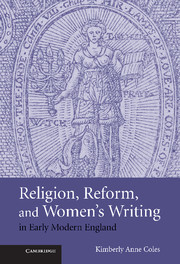Book contents
- Frontmatter
- Contents
- Acknowledgments
- Abbreviations
- Introduction: Making sects: women as reformers, writers, and subjects in Reformation England
- 1 The death of the author (and the appropriation of her text): the case of Anne Askew's Examinations
- 2 Representing the faith of a nation: transitional spirituality in the works of Katherine Parr
- 3 ‘[A] pen to paynt’: Mary Sidney Herbert and the problems of a Protestant poetics
- 4 A new jerusalem: Anne Lok's ‘Meditation’ and the lyric voice
- 5 ‘A Womans writing of diuinest things’: Aemilia Lanyer's passion for a professional poetic vocation
- Afterword
- Notes
- Index
4 - A new jerusalem: Anne Lok's ‘Meditation’ and the lyric voice
Published online by Cambridge University Press: 06 July 2010
- Frontmatter
- Contents
- Acknowledgments
- Abbreviations
- Introduction: Making sects: women as reformers, writers, and subjects in Reformation England
- 1 The death of the author (and the appropriation of her text): the case of Anne Askew's Examinations
- 2 Representing the faith of a nation: transitional spirituality in the works of Katherine Parr
- 3 ‘[A] pen to paynt’: Mary Sidney Herbert and the problems of a Protestant poetics
- 4 A new jerusalem: Anne Lok's ‘Meditation’ and the lyric voice
- 5 ‘A Womans writing of diuinest things’: Aemilia Lanyer's passion for a professional poetic vocation
- Afterword
- Notes
- Index
Summary
Western lyric discourse can be seen to operate dialectically between the ritual and fictional modes, asking us both to re-experience its statements from the inside and to interpret them from the outside, but often to do one of these things at the expense of the other…[I]nnovation within the lyric genre often occurs through such a reweighing of these phenomena against each other; and…the English Psalters show the cooperation and tension of these modes in unmistakable relief – show themselves, in fact, to operate as indirect theoretical statements about the nature of lyric.
Roland Greene, ‘Sir Philip Sidney's Psalms…and the nature of lyric’It is ironic that I have been using the term ‘lyric’ in the modern sense, when the origin of the word declares its associations with song. But the distinction that I have been making – between merely metrical compositions set to music and intended for ritual, or collective, use, and those conceived as lyric poems to excite the imagination of individual readers – is evident both in the exercise of sixteenth-century psalm translation and the contemporary discussions of the practice. Greene recognises the distinction, but he underestimates the rupture that occurred between these aims in connection to devotion. His argument charts the emergence of devotional lyric as an outgrowth of psalm translation: a recalibration of the ritual and subjective elements involved in the transmission of scriptural language.
- Type
- Chapter
- Information
- Religion, Reform, and Women's Writing in Early Modern England , pp. 113 - 148Publisher: Cambridge University PressPrint publication year: 2008
- 3
- Cited by



